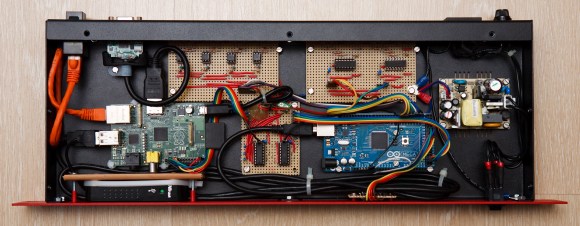
Not just another pretty enclosure, this shiny little red box is [Lauri’s] stand-alone MIDI workstation. The build uses an Arduino Mega 2560 to handle the MIDI inputs and outputs. It communicates via serial with a Raspberry Pi that acts as a sequencer and oversees all user interactions. The Pi’s SD card offers convenient storage for your work, though we wish it was easily ejectable from the front of the box and not trapped under the hood. [Lauri’s] RPC also squeezes in the necessary USB hub for the RasPi and an HDMI-to-VGA converter. As an all-in-one solution, this is a sleek little box that–once paired with some software for arpeggiators, chord harmonies, and scales–will be a handy MIDI sequencer with robust control ready to be conveniently mounted on your rack.
Now all you’ll need is something to plug in. Why not check out the custom MIDI recorder we featured last week, or the organ-to-MIDI keyboard conversion for inspiration.
[Thanks Teemu]















Very nice polished look and interesting soundclips… I like it!
I want to shorten those cables so badly, it’s distracting me from the rest of it.
I had the same problem with one of my projects, mounting a Pi in a case. The thing is you can get bulkhead cables for around $2-3 delivered on eBay, albeit in various inconvenient lengths, while a bulkhead connector and a shorter cable can end up costing you $15.
Just to point out this isn’t a synthesiser. That is another project of his. This is just a midi processor/sequencer it is not designed to produce any sound of its own.
You are correct! I meant to write “sequencer,” but my brain failed me. Fixing it to avoid confusion; thanks for the catch =)
With all the perfboard, why didn’t he build his own arduino clone? It would have required less cable mess, too.
I used to think like that, but these days the couple dollars you save really isn’t worth the hassle. I just got two official (well they look official) Arduino Leonardo for $20 ($10 each) – with usb cables off ebay.
I’m a little confused by the link. This looks like a commercial product, not a hack. He asks you to email if you are interested in a DIY, Kit or unit, but no links to software or schematics. That’s fine and I respect the work that was put into this. But I thought this was about open source projects. Is this a change in direction for Hack-A-Day?
From various postings, it looks like design isn’t far enough along that the creators are willing to release board layouts to the general public.
From http://rpc.gehennom.org/2013/03/usb-midi-interface/ :
“I will add the gerber files and BOM here later. Drop me an email if you’re interested in them or the Eagle source files (see bottom of page for the address)”
Nobody loves rotary phase converters :(
Beautiful case!
I’ve been working on a design which will need a 1u rackmount case and I really appreciate finding the link to Protocase on Lauri’s site.